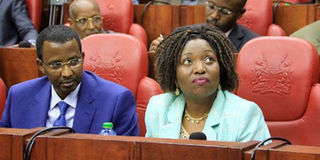Impending departure of IEBC bosses is positive, but there is more

Independent Electoral and Boundaries Chairman Isaac Hassan (left) and Vice-Chairperson Lilian Mahiri-Zaja before a joint parliamentary select committee on the body at Parliament Buildings on August 2, 2016. PHOTO | JEFF ANGOTE | NATION MEDIA GROUP
What you need to know:
We need an electoral body that is truly independent in word and action.
All actors involved in the current process must ensure that the new commissioners are truly people of integrity and capable of safeguarding the autonomy of the IEBC.
I know that there are Kenyans with this capacity and who are willing to secure our electoral process.
The impending departure of commissioners of the Independent Electoral and Boundaries Commission is good for Kenya. But this is only good if voters ensure that all stakeholders commit to a consistently independent IEBC.
The exit is good because the current commission failed to grab, fiercely protect and secure its autonomy. It must be recalled that this was the first set of commissioners following the promulgation of the 2010 Constitution. These commissioners were appointed, vetted by Parliament and confirmed to their positions. The confirmation gave them an autonomous mandate that is constitutionally protected.
The key word in the name of IEBC is independent. It is the word that gives meaning to their very reason of existence. This, however, does not mean autonomy from Kenyans; the IEBC must constantly acquit itself in the eyes of public opinion because that is where legitimacy is assessed. Independent refers to autonomy from those actors who desire to bias the electoral process.
What secures the legality but, more importantly, the legitimacy of the commission is the extent to which the words and actions of IEBC officials demonstrate a scrupulous commitment to its independence and willingness to be accountable to a plurality of Kenyans. Yet, to a plurality of Kenyans, this commission failed the independence test and lost legitimacy in the eyes of most voters.
Contrast this with other commissions or institutions whose independence was entrenched in the 2010 constitution. Other commissions performed to different levels of credibility in securing their autonomy. The Commission for the Implementation of the Constitution (CIC) strove, amidst difficult conflicting political currents, to assert and defend its autonomy. The Commission on Administrative Justice, too, performed well under the leadership of Mr Otiende Omollo.
OVERSIGHT AUTHORITY
The other institution that has operational autonomy is the Independent Policing Oversight Authority. It has been consistent and exemplary in its performance. This is why it has been the target of derision from the National Police Service Commission and attack by the Kenya Police Service. At some point, a legislative move that was ultimately declared unconstitutional was initiated to compromise IPOA. The police, however, persist in harassing, intimidating and even assaulting IPOA investigators. In the current turn of events, I am informed that an IPOA investigator was intimidated with a firearm, and later thrown into police cells while investigating the Officer Commanding Police Division of Kayole, Nairobi, who has at least four cases or files of human rights violations that are under investigations at IPOA.
We also have a history of institutions that secured their freedom and performed their mandate with distinction. The Kenya National Commission on Human Rights under Mr Maina Kiai secured such independence. Of course, the Judiciary under the leadership of Dr Willy Mutunga also secured its independence and enabled judges to make decisions on the basis of their reading of the law.
It is easy to forget that only a few years ago, senior judicial officers trooped to each and every presidential public meeting. Today, that trooping is rare; indeed, it was not until the former Deputy Chief Justice showed up at a presidential function that I was reminded that this used to be normal in the Kanu days. The legitimacy the Judiciary enjoyed under Dr Mutunga is now documented. Even some of the most vociferous public critics of the Judiciary under Dr Mutunga are on record privately praising him for his achievement.
We need an electoral body that is truly independent in word and action. All actors involved in the current process must ensure that the new commissioners are truly people of integrity and capable of safeguarding the autonomy of the IEBC. I know that there are Kenyans with this capacity and who are willing to secure our electoral process. We are not asking for a perfect electoral process; we are asking for a process in which the threshold of acceptable error is kept.
Godwin R. Murunga is a senior research fellow at the Institute for Development Studies at the University of Nairobi.





